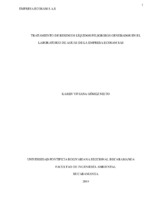| dc.contributor.advisor | Quintero Duque, Claudia Sofía | |
| dc.contributor.author | Gómez Nieto, Karen Viviana | |
| dc.coverage.temporal | 2019 | |
| dc.date.accessioned | 2021-04-12T19:42:25Z | |
| dc.date.available | 2021-04-12T19:42:25Z | |
| dc.date.issued | 2019-09 | |
| dc.identifier.uri | http://hdl.handle.net/20.500.11912/8239 | |
| dc.description | 79 páginas | spa |
| dc.description.abstract | El presente trabajo de grado aborda el tema de tratamiento de residuos líquidos peligrosos generados en los laboratorios ambientales específicamente en el laboratorio de aguas de la empresa ECOSAM SAS (Empresas Colombianas con Soluciones Ambientales) ubicada en la ciudad de Bucaramanga, allí se realizan análisis tísico químicos de laboratorio los cuales requieren del uso de reactives los cuales son peligrosos tanto para el ser humano como para el medio ambiente. Al realizar los cálculos matemáticos se determinó que la cantidad de reactivo por mililitro de residuo liquido generado en cada uno de los análisis mencionados anteriormente, presentan concentraciones finales pequeñas para los análisis de DBO, alcalinidad, grasas y aceites debido a que sus principales reactivos son ácidos corrosivos que dependiendo de su pH se pueden mezclar y neutralizar entre ellos mismos y de este modo ser vertidos al alcantarillado, para el caso de los nitritos y nitratos las concentraciones finales también se pueden decir que son pequeñas pero a pesar de esto los reactivos utilizados presentan características peligrosas que al combinarse un residuo con el otro no se sabe de qué manera reaccionen, por lo cual se recomienda realizar pruebas de bioensayos con especies de fauna y lora en presencia de estas sustancias, estos residuos se deben almacenar por separado y no mezclarse entre sí, Para el análisis de la DQO también se realizaron los cálculos matemáticos pero a pesar de dar concentraciones bajas el uso de reactivos que contienen mercurio hacen que este residuo no se pueda tratar de manera económica dentro de las mismas instalaciones de la empresa por lo tanto es mejor que sea recogido y tratado por la empresa prestadora de estos servicios especializados para residuos peligrosos. A su vez se propuso almacenar los residuos de los análisis de alcalinidad, DBO grasas y aceites en un mismo recipiente plástico de 12 galones y al estar en su totalidad lleno medir el pH y neutralizar los residuos. | spa |
| dc.description.abstract | This degree work specifically addresses the issue of treatment of hazardous liquid waste In environmental laboratories in the laboratory of waters of the company ECOSAM SAS (Empresa Colombians con soluciones ambientales) located in the City of Bucaramanga, there are physical analysis chemical laboratory which require the use of reagents resulting characteristics be dangerous both for human beings and environment.Whon performing mathematical calculations determined that the amount of reagent per milliliter of waste liquid generated in each of the analyses mentioned above, present small final concentrations for the analysis of BOD, alkalinity, fats and oils since its main reagents are corrosive adds that depending on Its pH can mix and neutralize each other, and in this way be dumped into the sewer, in the case of the nitrites and nitrates the final concentrations also are they can say that they are small but despite this reagents have dangerous characteristics that combined a residue with another not known how to react, so it is recommended to perform bioassay tests for the behavior of plants or animals in the presence of these substances, these wastes must be stored separately and not mixed with each other, for the analysis of cod were also the math caculations but despite low concentrations give the use of reagents containing mercury make this residue not s Beardsley treat economically within the same facilities of the company by the It was determined that it is better to be collected and treated by the company that provides these services for hazardous waste. At the same time proposed storing waste from the analysis of alkalinity, BOD fats and oils in a plastic pot 12 gallons and the nights in full measure the pH and neutralize waste with water samples that surplus to conduct the analysis of BOD and to achieve neutrality for its subsequent shedding to the sower system. | eng |
| dc.format.mimetype | application/pdf | |
| dc.language.iso | spa | |
| dc.publisher | Universidad Pontificia Bolivariana | spa |
| dc.rights | Attribution-NonCommercial-NoDerivatives 4.0 International | * |
| dc.rights.uri | http://creativecommons.org/licenses/by-nc-nd/4.0/ | * |
| dc.subject | Empresas - Ecosam S.A | spa |
| dc.subject | Residuos peligrosos | spa |
| dc.subject | Residuos industriales | spa |
| dc.subject | Pruebas químicas | spa |
| dc.subject | Agua - Purificación | spa |
| dc.title | Tratamiento de residuos líquidos peligrosos generados en el laboratorio de aguas de la empresa Ecosam SAS | spa |
| dc.type | Práctica | spa |
| dc.publisher.department | Escuela de Ingenierías | spa |
| dc.publisher.program | Ingeniería Ambiental | spa |
| dc.type.hasVersion | publishedVersion | spa |
| dc.description.sectional | Bucaramanga | spa |
| dc.description.degreename | Ingeniero Ambiental | spa |


